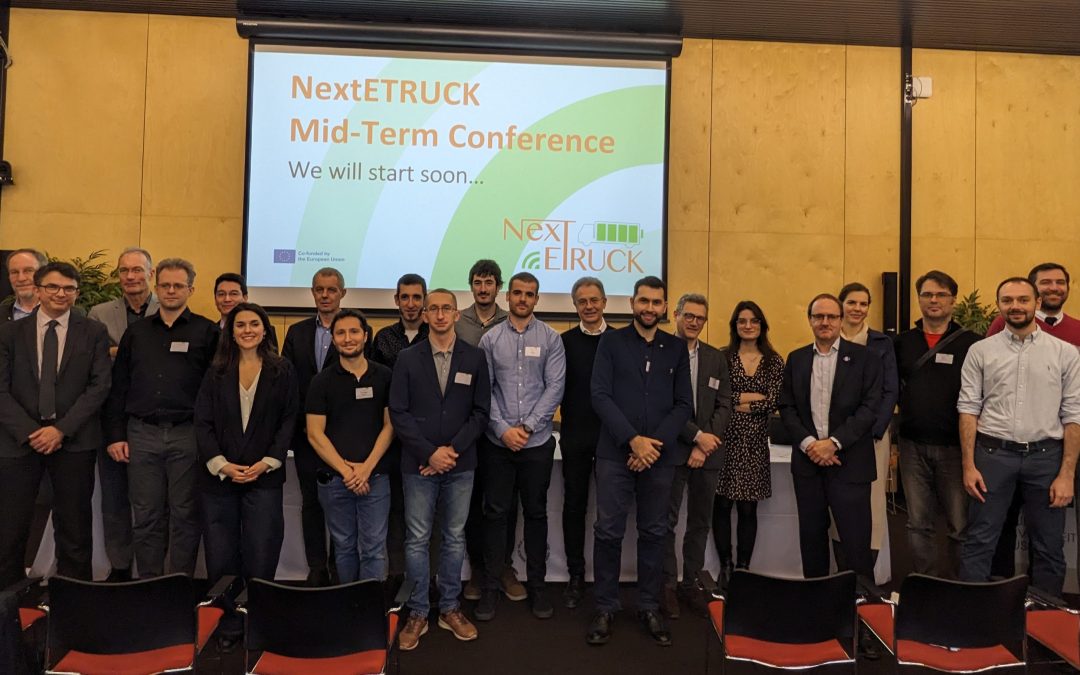The NextETRUCK Mid-Term Conference, which took place on 21 February 2024 in Brussels and was attended by more than 40 stakeholders, highlighted the importance of cooperation between cities, projects, OEMs and the road freight industry. The event, which was organised by POLIS Network and the VUB, provided a forum for such exchange, while also sharing first project results related to the NextETRUCK pilots and innovative actions, as well as promoting the cooperation with other EU-funded projects. A subsequent opportunity to engage with NextETRUCK is the upcoming TRA 2024 Conference in Dublin, Ireland from 15-18 April.
The full-day hybrid event was divided into three core segments, including NextETRUCK updates, a roundtable discussion concerning the challenges for cities, as well as presentations and a conversation on the future of zero-emission freight with several AEVETO-cluster projects. The following paragraphs are summarising several aspects of the discussion. If you would like to receive a more detailed overview, please study all available presentations at the end of this article.
Real-world testing of innovative zero-emission HDV solutions
After a brief introduction by POLIS Network and René Corbij as project coordinator, a detailed overview of several main innovations were provided by work package leaders, including digital twinning, IoT design, charging solutions, as well as components, testing and vehicle integration. Plenty of time was also dedicated to questions from the audience.
The digital twinning aspects, as highlighted by Steven Wilkins (TNO), are mostly focusing on gathering and assessing data from the surroundings (charging stations, traffic) and the vehicle (e-axle, batter, cabin etc.), which is compared to a set of control data from the vehicle. Furthermore, models and simulation tools will be used to calculate the cost parameters and therefore the total cost of ownership of the tested zero-emission HDVs.
Vehicle charging is another important innovative aspect, since it will determine the vehicle operation- and recharging time, depending on the battery components. Thus, three different battery systems were tested for their efficiency and approximate operation cost. The other aspect is the development of a charging management plan for depots, which can determine charge opportunity windows based on the available charging stations and stationed trucks at the depot, related to their loading and unloading times.
NextETRUCK pilot plans
Even though the real-world testing of the electric trucks will only start early 2025 in Turkey, the United Kingdom and Spain, preparations are ramping up. Thus, the plans are fully elaborated, whether the focus is on distribution logistics in Istanbul, waste collection in Barcelona or back-to-base logistics in London. All three pilots, which will operate in real-world environments, will use overnight charging and will operate for a period of around six months in urban- and peri-urban environments.
Roundtable discussion ‘challenges and opportunities of urban freight’
Raffaele Vergnani (POLIS) moderated the discussion between Julia Hildermeier (The Regulatory Assistance Project (RAP)), Ian Catlow (City of London) and Steven Wilkins (TNO) about the challenges of electric HDV charging infrastructure, decarbonisation strategies, as well as a potential outlook of vehicle uptake in the next years. Furthermore, cities need to establish support plans for dedicated charging infrastructure around freight depots, as they require high power demands, both during peak- and off-peak hours. Nevertheless, intelligent charging management tools can reduce peak power use, according to Julia Hildermeier, who shared project results, which showed that state-of-the-art charging management tools could reduce peak power use at a logistics depot by up to 35% (based on tests of 35 vehicles), which would result in significant cost savings for freight operators.
Spotlight on AEVETO Cluster projects
NextETRUCK and several other EU-funded zero-emission freight projects have formed a cluster to promote exchange between partners, align communication and find synergies – the so-called ‘AEVETO Cluster’. Since NextETRUCK strongly supports these efforts, a forum was given to the AEVETO projects of H2Haul, ESCALATE and EMPOWER. After a brief project presentation, a discussion about the future of zero-emission freight and potential obstacles on the road towards HDV deployment took place, moderated by cluster coordinator Omar Hegazy (VUB).
Whereas NextETRUCK tests electric HDVs in (peri-)urban areas, ESCALATE tests hybrid (hydrogen- & electrically propelled) long-haul vehicles, which operate on several (cross-border) routes in the EU and beyond. The EMPOWER project is a mix between the other two projects, as it tests both types of vehicles, an electric one for regional (under 400km) deliveries and a hybrid truck for long-haul operations. H2Haul on the other hand solely focuses on hydrogen trucks, which are tested in real-world daily operations in four different countries.
Download the presentations
Innovation Presentations
- NextETRUCK Introduction
- Digital Twinning & Virtual Integration
- Prototyping
- Modular & Interoperable IoT System Design
- Charging

